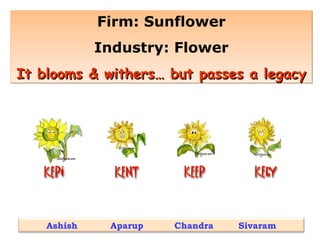Industrat - Sunflower Industry Performance
- 1. Firm: Sunflower Industry: Flower It blooms & withers… but passes a legacy Ashish Aparup Chandra Sivaram
- 2. Where did we start? Portfolio Brand Base cost ($) Tech Mkt share ($ terms) Actual Cost ($) Gross Contribution KENT 297 1 4.80% 322 5787 KEPI 356 1 6.40% 367 3779 KEEP 380 1 7.50% 407 4131 KELY 273 3 5.40% 315 5999
- 3. The First Step… plan for future Initiated Research for Lomex Technology One of the pioneers in the Lomex market Increased sales force Aligned sales and technical forces to the stages of adoption process Targeted the lucrative market segments Controlled Korex production to avoid excessive inventory Products were priced in tune to the inflation New Korex Product launch based on perception map Korex products contributed less to the profits No development was done to the Korex products to bring down base costs Lomex compensated for our losses made by the Korex products
- 4. Where did it take us? Stock prices plunged before Lomex product launch Highly burdened with debt Unit cost of Korex products increased Korex products had negative contribution
- 5. Period of Research in Lomex technology Collaboration with Firm 1 for Technology-2 Downturn in Korex Launch the Lomex technology Products Rejuvenate Korex Lomex made us market Leaders again!!!
- 6. What will our successors takeover? Portfolio Strategically positioned products in East & Centre and consumer products Product Base Cost Price KENT 350 580 KEPI 308 580 KELY 292 620 KEPP 216 480 KESG 308 500 KEAS 467 700 LEAP 153 600 LECM 142 550 LESG 128 400 NMC (Estimated) 18000 Stock Price (Estimated) 34 Budget (Estimated) 7800 Sales Force 56 Technical Force 25
- 7. How we functioned as an organization… Innovation for new products in Lomex technologies Clear distribution of roles and responsibilities Collaboration for Technology-2 product Stood united even during testing times What we would do differently? Consolidate our position in the Korex market using the existing technologies (1 & 3) Exercise caution when making decisions using incomplete information
- 9. Learning by doing Theoretical Terms / Concepts Net Marketing Contribution Four stages of adoption process Perceptual map of products See the reality of differences between base cost and unit cost Lowering prices doesn’t always increase the market share Identify the trend in the ideal points and predict the future ideal points of the product New product in existing market (Korex) takes time to settle down Divide sales & technical force according to the adoptions stages of your products and market segments Continuous R&D keeps the base cost of your products down Constantly keep an eye on market (via researches/surveys) and adapt to the changing environment Know your market share, total demand and future forecast
- 10. Which Market Research Report did we find most useful and why? Market Share Depending on Region/stages of adoption process, our product position information was important Perceptual Map Guide for developing specs of new products Market Forecast To produce according to demand and avoid inventory Competitive Information Indicated the market mood & Competitor Plans Every market research information has a typical usage and none of them can be discarded. However our firm used less information from the following in comparison to other types of market research Supplier Survey Semantic Scales
- 11. Ěý
Editor's Notes
- We targeted the East and Central Region more due to higher relative growth rate aspects.
- unit cost will be much higher if you produce lesser units Be quick to determine the potential for a new product in new market (here Lomex), if launched properly can yield high returns (Say focus more on production manager is product is in testing or supplementary phase) Continuous R&D is an indicator of a healthy company











